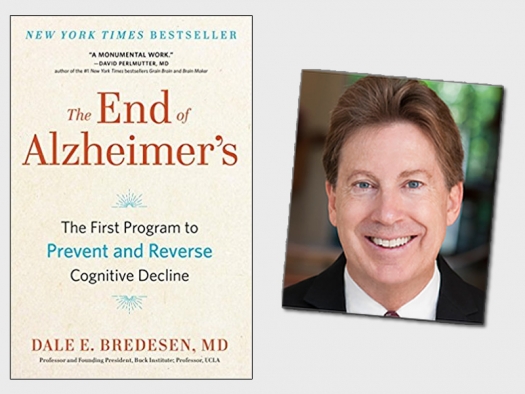Peggy Sarlin's Awakening from Alzheimer's interview with Dr. Dale Bredesen
TheEndOfAlzheimersDaleBredesen.jpg

The End of Alzheimer's by Dale Bredesen, MD
We are seeing that we are in the dawn of the era of treatable Alzheimer’s disease. One hundred people have gone through Dr. Dale Bredesen’s program. They are seeing dramatic and unprecedented improvements including improvement on hippocampal volume on MRI, improvements in quantitative neurocyte testing, ability to return to work, improved memory, and improved ability to interact with family and friends.
It is necessary to determine the problem. Amyloid plaque is not the problem as it is a protective response to three different toxic and metabolic conditions.
Type I: Inflammation and infections. These include oral bacteria, spirochetes, fungi, mold, and sugar consumption which all inflame the brain. Amyloid plaque develops as an anti-inflammatory response.
Type II: This is a withdrawal of trophic support. If the following factors are low: hormones, Vitamin D, nerve growth factor, brain derived neurotrophic facts, etc., the brain structure and synapses are no longer supported. Amyloid plaque develops as a part of the downsizing.
Type III: Amyloid is developed to bind to toxic metals like mercury, copper and iron as well as mycotoxins and Lyme related toxins.
Types I and II are the easiest to treat. Removing the toxins makes Type III the hardest to address. Even though the amyloid plaque has a protective role, if it is too abundant there is enhanced neurodegeneration.
In today’s medical paradigm we are asking why it is, not what it is. That is the basis for functional and integrative medicine. Dr. Bredesen gets to the root cause of why a patient has Alzheimer’s with extensive metabolic profiling to determine if it is Type I, II, or III. You can have combinations, as well. In these cases you look at which type is “driving” the disease. Dr. Bredesen has found 36 drivers. The pharmaceutical drugs available cannot begin to address all of these drivers. If you fix the metabolic input to the amyloid and the inflammatory and infectious processes you see marked improvement.
Dr. Bredesen looks at over 100 parameters that are contributing to the cognitive decline. For example, hormones, Vitamin D, minerals, stress, inflammation, etc. Within the brain there is synaptoblastic activity (building synapses) and synaptoclastic activity (destroying synapses). The goal is to get a balance to maintain synapses once again. For this the Bredesen Protocol is used.
A program is determined and the patient, along with the help of a health coach or caregiver, does the program each day. For example the diet concentrates on healthy fats and low carbs. There is a dangerous triad of simple carbs, saturated fats and low fiber – the three together are very damaging. He recommends limiting meat, but when consuming it choose healthy meat like grass-fed beef, pastured eggs, wild caught fish low in mercury (salmon, mackerel, anchovies, sardines and herring). In addition the omega 3 oils need the support of the secoiridoids and phlorotannins to be beneficial. Avoid white foods like potato, rice and white bread. Dr. Fasano’s work indicates most people, not just those with celieac, do not do well with gluten. These are people other than those with celiac disease. Fruits should be limited to those with the lowest glycemic index.
It is important to have a 12-16 hour fast at night from the last food at night to the first food in the morning. It is a time to flush out the brain. Eat your last meal 3 hours before bedtime. This gives you an 8-10 hour window for eating during the day.
Optimizing your metabolism and optimizing your biochemistry helps optimize your cognition.
For a complete account of the protocol refer to Dr. Bredesen’s book: The End of Alzheimer's: The First Program to Prevent and Reverse Cognitive Decline. It is available on Amazon and other outlets where books are sold.


